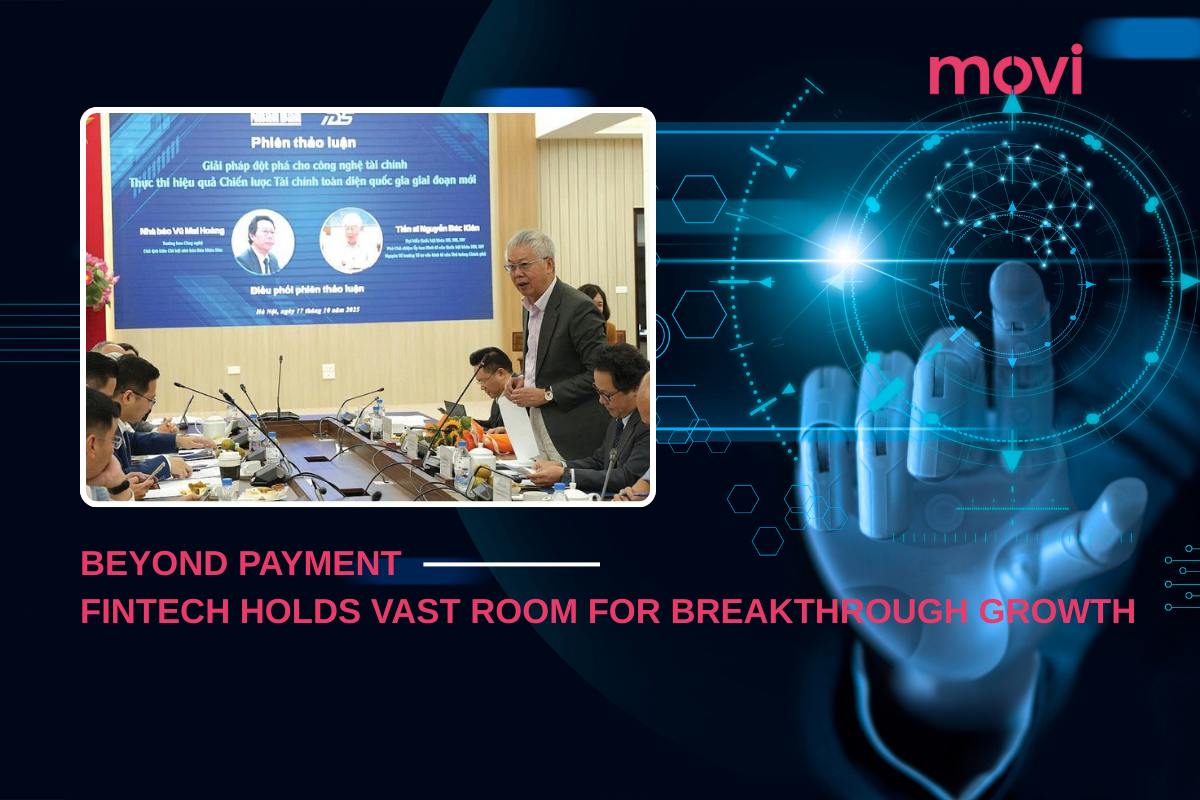
Loading
OPPORTUNITIES FOR FINANCIAL INSTITUTIONS AND TECHNOLOGY COMPANIES
At the 2026 Business Forum: “New Growth Space – Opportunities and Strategies”, leading experts gathered to analyze key growth drivers and discuss strategic approaches toward achieving Vietnam’s ambitious GDP targets. The dialogue spanned across themes of private-sector momentum, digital economy expansion, regulatory frameworks for digital and tokenized assets, and the outlook of capital markets including stocks, gold, and silver investment channels.

Speakers at the 2026 Business Forum “New Growth Space – Opportunities and Strategies”
Diversified Opportunities in Asset Allocation
According to the Ministry of Finance’s General Statistics Department, Vietnam’s economy recorded its highest Q3/2025 growth rate in years, while inflation (CPI) remained low, credit growth rose sharply, and the USD/VND exchange rate stabilized. These factors create strong momentum for high economic growth in the coming years.
To achieve double-digit GDP growth targets during 2026–2030 and 2030–2045, the Government has identified the private sector as a core engine of the national economy, as stated in Resolution 68-NQ/TW (April 2025). This vision is further detailed in Resolution 138/NQ-CP (Government Action Plan) and Resolution 198/2025/QH15 (May 2025), both of which emphasize digital transformation and innovation as key drivers of breakthrough growth for private enterprises.
Huỳnh Minh Tuấn, Founder of FIDT and Vice Chairman of APG Securities, noted that Vietnam’s economy is entering a new phase of robust expansion, supported by favorable macroeconomic indicators. As traditional growth engines align with new digital and financial catalysts, investors are presented with unprecedented opportunities to diversify their asset portfolios.
The stock market stands out as a key channel, expected to benefit from three main factors:
The upcoming upgrade of Vietnam’s stock market to “Emerging Market” status, attracting large-scale passive capital inflows from global ETFs.
Enhanced transparency and governance, drawing strong participation from both foreign institutions and domestic retail investors.
A surge of IPO activities from major enterprises projected through 2027, making the market more vibrant and diversified.
Meanwhile, the corporate bond market is showing a solid rebound. In the first nine months of 2025, total corporate bond issuance reached approximately VND 425 trillion, a 35% year-on-year increase. The Government aims to expand the bond market’s scale to 25% of GDP by 2030 (up from 7% today), signaling vast growth potential ahead.
In the real estate sector, Tuấn observed that Vietnam is entering a new cycle following a restructuring period (2020–2023). Early recovery signs emerged in late 2024 and continued into mid-2025, supported by favorable macro conditions and government policies. Over the next decade, demographic advantages, urbanization, and synchronized infrastructure development are expected to fuel sustained housing demand and long-term market growth.
Resolution No. 05: Safeguarding Investors and Managing Risks
Dr. Nghiêm Minh Hoàng, Financial Economist from the Vietnam Blockchain & Digital Assets Association (VBA), emphasized that crypto assets and Resolution No. 05 are among the most closely watched topics heading into early 2026. The VBA has long advocated for collaboration with regulators, but as the pilot exchange launch approaches, the association now urges a more cautious approach due to three major challenges.
First is the regulatory challenge. Vietnam’s policy stance has shifted dramatically—from an outright ban to cautious acceptance and now to official pilot programs. Resolution 05 stipulates stringent requirements, including a minimum charter capital of VND 10 trillion for participating enterprises, repatriation of offshore digital assets, and specific regulations on cross-border issuance and cybersecurity. As the market reacts to this new legal framework, it may take 2–3 years for full adaptation.
Second is the operational and governance challenge. Global cyberattacks have underscored that vulnerabilities often arise from human error, not technology. Vietnam lacks prior experience managing digital assets, and while the Government encourages innovation, it will not underwrite investment risks.
From an enterprise perspective, Lê Bảo Nguyên, Deputy CEO of SSID, highlighted that the digital asset market, though promising, entails significant financial and compliance risks. With a minimum capital requirement of VND 4 trillion, this is a field reserved for financial institutions with strong capital bases and technological capabilities—not early-stage startups.
Resolution 05 was crafted with a prudent spirit: to protect investors and mitigate systemic risk. First movers may enjoy a timing advantage and ecosystem leadership, but must also invest heavily in infrastructure, technology, human resources, and international-standard operations.
According to Dr. Võ Trí Thành, Director of the Institute for Brand and Competitiveness Strategy, Vietnam is at a pivotal moment in its digital economic evolution — with the number of crypto accounts now exceeding stock trading accounts. As the Government advances its vision to establish an international financial hub, Resolution 05 marks a landmark step in formally recognizing and shaping the digital asset market in Vietnam.
In the near future, a new wave of participation is expected — led by major financial institutions and technology corporations — all seeking to harness the opportunities of a regulated, innovation-driven digital financial landscape.














